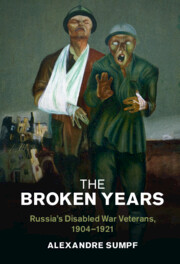Book contents
- The Broken Years
- Studies in the Social and Cultural History of Modern Warfare
- The Broken Years
- Copyright page
- Contents
- Figures
- Tables
- Acknowledgements
- Note on Usage
- Introduction
- 1 An Overwhelming Loss
- 2 The Right to Health
- 3 A Social Status Renegotiated by the War
- 4 Discriminatory Social Welfare
- 5 An Ephemeral Political Spring
- 6 The Devaluation of the War Experience
- Conclusion
- Bibliography
- Index
4 - Discriminatory Social Welfare
Published online by Cambridge University Press: 10 February 2022
- The Broken Years
- Studies in the Social and Cultural History of Modern Warfare
- The Broken Years
- Copyright page
- Contents
- Figures
- Tables
- Acknowledgements
- Note on Usage
- Introduction
- 1 An Overwhelming Loss
- 2 The Right to Health
- 3 A Social Status Renegotiated by the War
- 4 Discriminatory Social Welfare
- 5 An Ephemeral Political Spring
- 6 The Devaluation of the War Experience
- Conclusion
- Bibliography
- Index
Summary
The Great War favoured the rapid rise of a national community and a local movement federated by philanthropical activity. While the various forms of involvement with the national cause of the war victims was conducive to the formation of a society of citizens, the veterans remained subjects for propaganda who were deprived of having a voice in matters. Even under the Provisional Government, the social assistance system for veterans was discriminatory and selective: they were required to remobilise by participating in the production effort without receiving the means to do so. In terms of functional rehabilitation, professional retraining, and the adaptation of recruitment practices, or working conditions, the national economy proved to be ill prepared for the reintegration of disabled veterans. Only the least afflicted physically and psychologically, the most determined, the least backward, and the most educated were able to benefit from private and institutional initiatives that were too scattered to form a coherent system. From the very beginning, their liberal nature ran counter to the progressive discourse’s ambition of transforming society. This extraordinary mobilisation of civilians did not transcend the deep fractures of Russian society.
- Type
- Chapter
- Information
- The Broken YearsRussia's Disabled War Veterans, 1904–1921, pp. 136 - 193Publisher: Cambridge University PressPrint publication year: 2022

